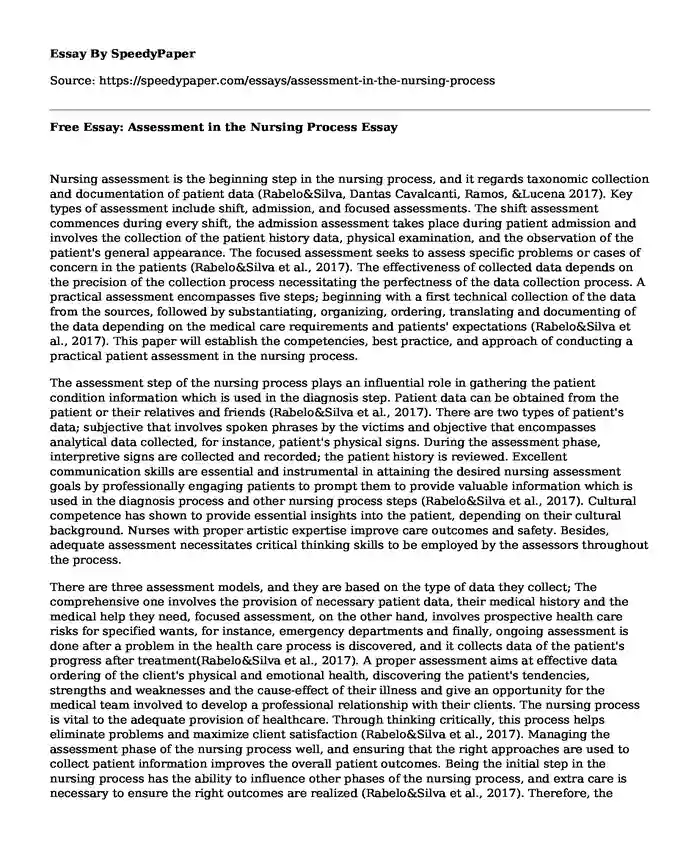
| Type of paper: | Essay |
| Categories: | Nursing care Customer service Human services |
| Pages: | 3 |
| Wordcount: | 707 words |
Nursing assessment is the beginning step in the nursing process, and it regards taxonomic collection and documentation of patient data (Rabelo&Silva, Dantas Cavalcanti, Ramos, &Lucena 2017). Key types of assessment include shift, admission, and focused assessments. The shift assessment commences during every shift, the admission assessment takes place during patient admission and involves the collection of the patient history data, physical examination, and the observation of the patient's general appearance. The focused assessment seeks to assess specific problems or cases of concern in the patients (Rabelo&Silva et al., 2017). The effectiveness of collected data depends on the precision of the collection process necessitating the perfectness of the data collection process. A practical assessment encompasses five steps; beginning with a first technical collection of the data from the sources, followed by substantiating, organizing, ordering, translating and documenting of the data depending on the medical care requirements and patients' expectations (Rabelo&Silva et al., 2017). This paper will establish the competencies, best practice, and approach of conducting a practical patient assessment in the nursing process.
The assessment step of the nursing process plays an influential role in gathering the patient condition information which is used in the diagnosis step. Patient data can be obtained from the patient or their relatives and friends (Rabelo&Silva et al., 2017). There are two types of patient's data; subjective that involves spoken phrases by the victims and objective that encompasses analytical data collected, for instance, patient's physical signs. During the assessment phase, interpretive signs are collected and recorded; the patient history is reviewed. Excellent communication skills are essential and instrumental in attaining the desired nursing assessment goals by professionally engaging patients to prompt them to provide valuable information which is used in the diagnosis process and other nursing process steps (Rabelo&Silva et al., 2017). Cultural competence has shown to provide essential insights into the patient, depending on their cultural background. Nurses with proper artistic expertise improve care outcomes and safety. Besides, adequate assessment necessitates critical thinking skills to be employed by the assessors throughout the process.
There are three assessment models, and they are based on the type of data they collect; The comprehensive one involves the provision of necessary patient data, their medical history and the medical help they need, focused assessment, on the other hand, involves prospective health care risks for specified wants, for instance, emergency departments and finally, ongoing assessment is done after a problem in the health care process is discovered, and it collects data of the patient's progress after treatment(Rabelo&Silva et al., 2017). A proper assessment aims at effective data ordering of the client's physical and emotional health, discovering the patient's tendencies, strengths and weaknesses and the cause-effect of their illness and give an opportunity for the medical team involved to develop a professional relationship with their clients. The nursing process is vital to the adequate provision of healthcare. Through thinking critically, this process helps eliminate problems and maximize client satisfaction (Rabelo&Silva et al., 2017). Managing the assessment phase of the nursing process well, and ensuring that the right approaches are used to collect patient information improves the overall patient outcomes. Being the initial step in the nursing process has the ability to influence other phases of the nursing process, and extra care is necessary to ensure the right outcomes are realized (Rabelo&Silva et al., 2017). Therefore, the assessment step provides evidence used to make critical decisions on the appropriate intervention.
In conclusion, the nursing assessment step of the nursing process is instrumental in the planning and provision of patient-centered care. Comprehensive and systematic nursing assessment is helpful in improving care outcomes by ensuring that patient care is informed by the available patient information. It is essential to set assessment in different stages, which provides continuous discovery of the patient concerns and promotes evidence-based diagnosis and care.
References
RabeloSilva, E. R., DantasCavalcanti, A. C., Ramos Goulart Caldas, M. C., Lucena, A. D. F., Almeida, M. D. A., Linch, G. F. D. C., MullerStaub, M. (2017). Advanced Nursing Process Quality: Comparing the International Classification for Nursing Practice (ICNP) with the NANDA
International (NANDAI) and Nursing Interventions Classification (NIC). Journal of clinical nursing, 26(3-4), 379-387. Retrieved from https://onlinelibrary.wiley.com/doi/abs/10.1111/jocn.13387
Cite this page
Free Essay: Assessment in the Nursing Process. (2023, Feb 03). Retrieved from https://speedypaper.com/essays/assessment-in-the-nursing-process
Request Removal
If you are the original author of this essay and no longer wish to have it published on the SpeedyPaper website, please click below to request its removal:
- Rich's Essay - Sample of a Stylistic and Thematic Review
- Economic Value Added - Cost Accounting Essay Sample
- Essay Example: Internal Medicine Personal Statement
- Is Technology Destroying Empathy? Argumentative Essay Example
- Ethics and Ethical Dilemmas in Our Free Essay Sample
- Free Essay: Transitioning From Student to Bachelor of Science in Nursing (BSN)
- Paper on Comprehensive Analysis of Hypovolemic Shock: Pathology, Causes, Symptoms, and Medications
Popular categories




